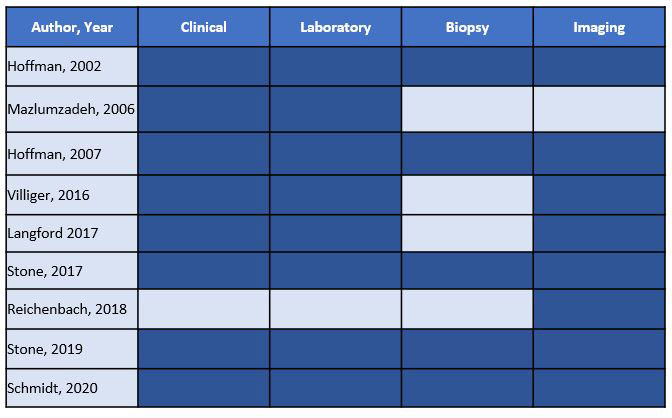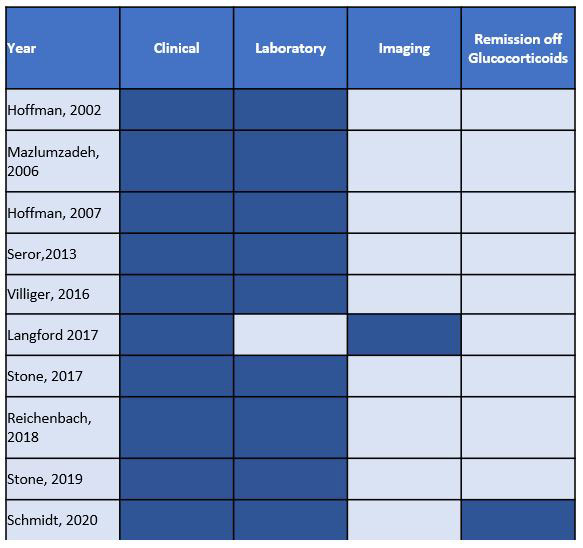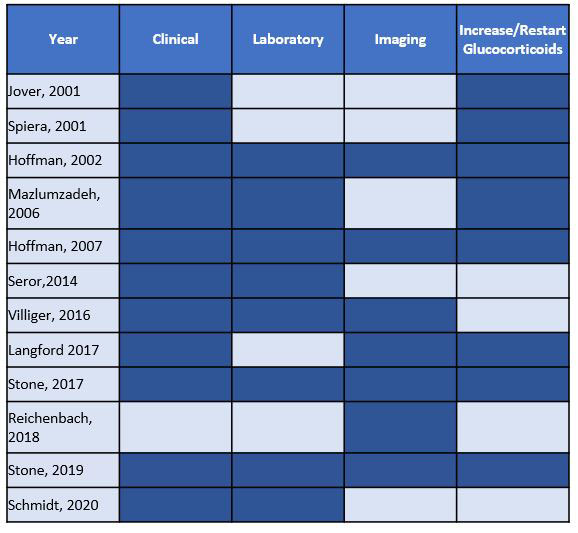Session Information
Date: Saturday, November 12, 2022
Title: Vasculitis – Non-ANCA-Associated and Related Disorders Poster I: Giant Cell Arteritis
Session Type: Poster Session A
Session Time: 1:00PM-3:00PM
Background/Purpose: Giant cell arteritis (GCA) is the most common form of large vessel vasculitis. While remission and relapse are common primary endpoints in clinical trials, a definition of response, which is assumed to be more sensitive to treatment than the former is still missing. We conducted a systematic literature review (SLR) to inform the task force responsible for the development of the response criteria in GCA. The major objective of this work was to identify descriptors and criteria used to assess disease activity, remission, and relapse in GCA, across different studies.
Methods: A search strategy was developed for Ovid Medline, Embase and Cochrane Central Register of Controlled Trials (up to March 29, 2021). No date or language limits were applied to the searches. ACR and EULAR abstract (2019-2020) were included. We included all studies, with more than 20 subjects diagnosed with GCA and reporting a definition of active disease, remission, improvement, relapse, flare and/or recurrence. Qualitative research papers were included as long as a definition of disease activity was present. The selection of studies was performed by 2 reviewers, data were extracted initially by a pair of 2 reviewers from a group of 3, and with good agreement, individual reviewers continued independently.
Results: The search identified 9199 articles, of which 406 were included for full-text review. After full-text exclusion, 109 studies were included (12 randomized controlled trials, 96 observational studies, and 1 Qualitative study). Active disease and change in disease state was described in 24 articles, remission in 44 articles and relapse in 87 articles.
Active disease was predominantly defined by a combination of active GCA signs/symptoms, abnormal inflammatory markers, and abnormal imaging (Primarily CTA, MRA, PET and angiogram) (Table 1). Response was not separately defined; trials primarily focused on remission and relapse. Remission was most frequently defined by a combination of the resolution of GCA signs/symptoms and normalization of inflammatory markers (Table 2). Symptoms of active disease included scalp tenderness, abnormalities in the temporal artery, ischemic symptoms (Vision loss, amaurosis fugax, stroke, claudication), polymyalgia rheumatica, and constitutional symptoms (weight loss, malaise, fever).
Relapse was most frequently described as a combination of recurrence of GCA symptoms, elevation of inflammatory markers and the need to re-initiate/increase glucocorticoids.
Regarding inflammatory markers, ESR and CRP were used in the majority of the studies to help in the assessment of disease activity. However, the specific values considered as normal vary among studies (ESR < 20-40 mm/h and CRP 5-15 mg/L).
Conclusion: Definitions of active disease, remission and relapse mostly included clinical symptoms of GCA and laboratory parameters of inflammation, however the description of the former remained vague and the cut-offs for inflammatory markers were heterogeneous. The results of this SLR will be used to identify a list of potential descriptors for GCA response criteria together with the subsequent steps towards the development of response criteria in GCA.
Acknowledgements: ACR and EULAR have provided funding for this work.
To cite this abstract in AMA style:
Sanchez Alvarez C, Bond M, Soowamber M, Camellino D, Touma Z, Ramiro S, Anderson M, Langford C, Dejaco C. A Systematic Literature Review to Generate Descriptors for the Development of New Response Criteria in Giant Cell Arteritis [abstract]. Arthritis Rheumatol. 2022; 74 (suppl 9). https://acrabstracts.org/abstract/a-systematic-literature-review-to-generate-descriptors-for-the-development-of-new-response-criteria-in-giant-cell-arteritis/. Accessed .« Back to ACR Convergence 2022
ACR Meeting Abstracts - https://acrabstracts.org/abstract/a-systematic-literature-review-to-generate-descriptors-for-the-development-of-new-response-criteria-in-giant-cell-arteritis/



